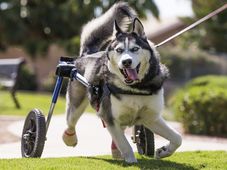
Paralysis
Paralysis is the inability to voluntarily move part of the body. The paralysed limb may be rigid or more likely, relaxed and flaccid. Pain, acute and severe, very often accompanies the paralysis. Whenever you encounter paralysis with your dog it’s advised to seek veterinary attention immediately.
In certain paralysed conditions, it is important to seek veterinary attention immediately. If surgery is required it will be carried out by a specialist veterinary surgeon and the sooner they operate in certain conditions, it is more likely your dog will be able to walk again. The take home message is seek veterinary attention immediately if your dog suddenly develops paralysis.
A dog can suddenly develop paralysis due to a rupture of an intervertebral disc, especially in the long-backed breeds such as Dashund. The ruptured intervertebral disc compresses the spinal cord and the severe cases require specialised surgery to decompress the spinal cord. The surgeons like to treat these animals within 12 hours of them becoming paralysed. Therefore, these cases are emergencies.
Paralysis can also be associated with traumatic incidents such as road accidents, falls, fights with other animals and possible intraspinal bleeds, or spinal tumours. When trauma is involved always suspect fractures and the instability of the spine – it is extremely important to immobilise the spine before transporting the dog to the vets.
Paralysis is a very serious condition, but dogs can recover from very serious conditions which have led to paralysis, but with prompt, expert advise and skill in surgery – some of these dogs can and will walk again.
However, the treatment plan should be discussed in great detail so the owner understands the risks involved, the hard work required by both the owner and the specialised veterinary surgeon and be made aware of all costs involved in this type of treatment.
What To Do
What Not To Do
Paralysis is the inability to voluntarily move part of the body. The paralysed limb may be rigid or more likely, relaxed and flaccid. Pain, acute and severe, very often accompanies the paralysis. Whenever you encounter paralysis with your dog it’s advised to seek veterinary attention immediately.
In certain paralysed conditions, it is important to seek veterinary attention immediately. If surgery is required it will be carried out by a specialist veterinary surgeon and the sooner they operate in certain conditions, it is more likely your dog will be able to walk again. The take home message is seek veterinary attention immediately if your dog suddenly develops paralysis.
A dog can suddenly develop paralysis due to a rupture of an intervertebral disc, especially in the long-backed breeds such as Dashund. The ruptured intervertebral disc compresses the spinal cord and the severe cases require specialised surgery to decompress the spinal cord. The surgeons like to treat these animals within 12 hours of them becoming paralysed. Therefore, these cases are emergencies.
Paralysis can also be associated with traumatic incidents such as road accidents, falls, fights with other animals and possible intraspinal bleeds, or spinal tumours. When trauma is involved always suspect fractures and the instability of the spine – it is extremely important to immobilise the spine before transporting the dog to the vets.
Paralysis is a very serious condition, but dogs can recover from very serious conditions which have led to paralysis, but with prompt, expert advise and skill in surgery – some of these dogs can and will walk again.
However, the treatment plan should be discussed in great detail so the owner understands the risks involved, the hard work required by both the owner and the specialised veterinary surgeon and be made aware of all costs involved in this type of treatment.
What To Do
- Keep the dog calm – possibly muzzle.
- Immobilise the dog prior to and during transportation
- Seek veterinary attention immediately.
What Not To Do
- Do not encourage the dog to move about.
- Do not delay in seeking veterinary assistance.
- Do not give any medication.

